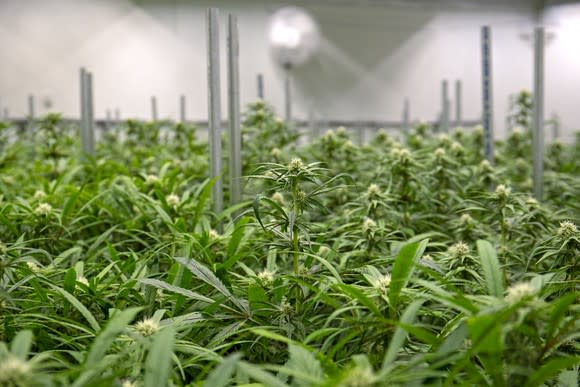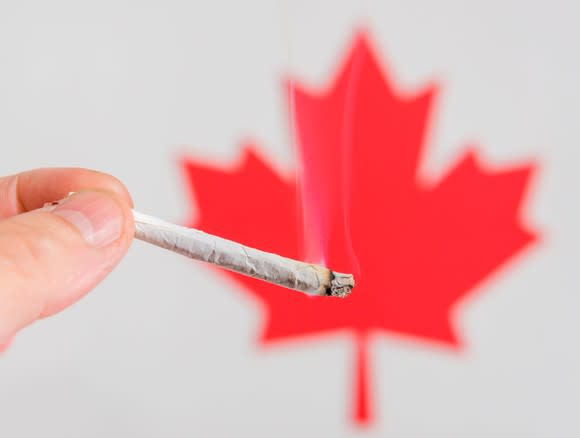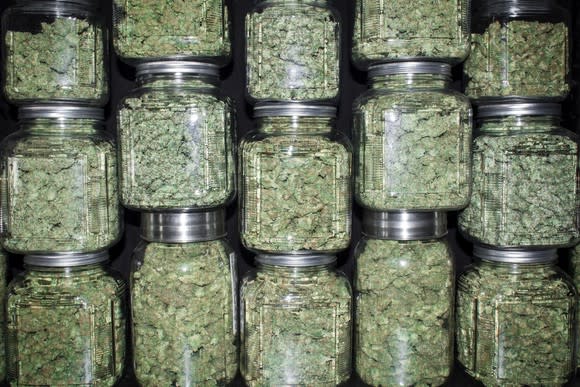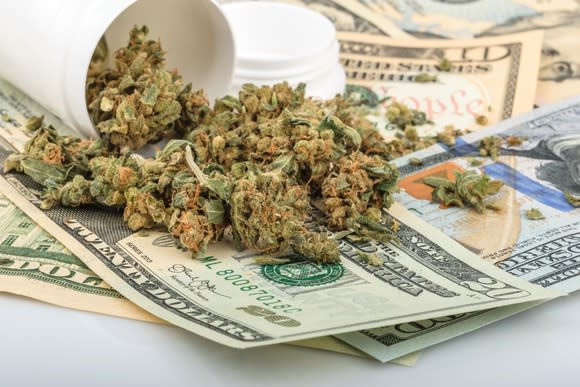It's Official: Canada's Recreational Marijuana Bill Has Been Delayed
Over the past couple of years, few, if any, industries have grown at a more robust pace than legal marijuana. Cannabis research firm ArcView has been calling for an annualized growth rate of 26% for the North America pot industry between 2016 and 2021, while Marijuana Business Daily's 2017 report, "Marijuana Business Factbook 2017," is forecasting 45% legal weed sales growth in the U.S. in 2018, and an aggregate quadrupling in sales between 2016 and 2021 to approximately $17 billion.
In addition to rapid sales growth, the public has really changed its tune on pot. In 1995, the year before California became the first state to legalize medicinal cannabis, a mere 25% of Americans supported the idea of making adult-use weed legal, according to a Gallup poll. But by this past October, just shy of two-thirds of respondents favored the idea of full legalization, representing an all-time high for Gallup's nearly five-decade-old survey.

Image source: Getty Images.
Growing sales and rapidly shifting support in favor of legalization have been the sparks that lit the fire under investors. Over the trailing year, a majority of the largest pot stocks (i.e., those with market caps in excess of $200 million) have doubled or tripled in value.
All marijuana markets are unique
Of course, marijuana markets can vary greatly from country to country. For instance, the United States could very well be world's the most lucrative market for marijuana, and it clearly has growing support from the public. Unfortunately, Congress has dug in its heels and made it extremely difficult for legal weed businesses to thrive in the United States. Cannabis firmly remains a schedule I substance, meaning it's wholly illegal like LSD and heroin, is prone to abuse, and has no recognized medical benefits.
Along with its schedule I classification in the states comes a slew of disadvantages for the businesses operating in the 29 states to have legalized weed in some capacity. Marijuana companies in the U.S. have minimal access to basic financial services, such as lines of credit or even checking accounts. Additionally, they're also unable to take normal corporate income-tax deductions as a result of U.S. tax code 280E. Assuming weed companies are profitable, they could be on the hook for an effective tax rate of 70% to 90%.

Image source: Getty Images.
Comparatively, just across the U.S. border to the north, Canada is becoming the blueprint for cannabis success. Canada legalized medicinal marijuana in 2001, with Health Canada overseeing licensing and regulation.
More importantly, Canada is also working on legislation (Bill C-45) that would legalize recreational cannabis by this summer. If approved, Canada would become the first developed country in the world, and second overall behind Uruguay, to have green-lighted the sale of pot to adults. It would also generate around $5 billion in added sales each year.
Surprise (or maybe not), Canada delays the launch of recreational pot
Since legislation was introduced by Prime Minister Justin Trudeau in April 2017, Trudeau and his colleagues have been pushing for a July 2018 launch date where adult consumers could begin purchasing cannabis. Support for the measure certainly appears to be there, with progressives outnumbering conservatives in parliament. In addition, Canada has already worked out a two-year tax-sharing agreement with all of its provinces.
However, the July 2018 timeline has turned out to be nothing more than a pipedream. This past week, Canadian Health Minister Ginette Petitpas Taylor announced that even if C-45 passes in the Senate during its scheduled June 7 vote, the official launch of recreational cannabis won't occur in July. It would, instead, likely happen in August or September, about 8 to 12 weeks after the final vote.

Image source: Getty Images.
The big issue for the delay appears to be the preparatory movement of the product to retailers. On Feb. 6, Taylor said, "They [Canada's provinces] told us they need 8 to 12 weeks following (adoption of the law) for preparatory activities to occur, such as preparatory movement of product from licensed producers to distribution and retail outlets," according to a Reuters report.
But this delay really shouldn't come as too much of a surprise for anyone who has followed the rise of the Canadian cannabis industry. Provinces have been complaining about a lack of funding, as well as time constraints in getting law enforcement trained, and product in place, pretty much since this bill was introduced 10 months ago. The fact that provinces need more time to get their infrastructure in place shouldn't shock anyone.
This is a real disappointment for growers with first-to-market advantages
The news of a one-, or perhaps two-month delay in the launch of recreational weed didn't sit particularly well with Canadian pot stock investors. Having already been pushed well off their all-time highs in recent weeks, most Canadian growers found reason to have another miserable day when the delay was announced.
While a 4-to-8-week delay probably isn't going to make a huge difference in the long-term outlook for the Canadian marijuana industry, there are certain first-to-market advantages that may be somewhat disrupted by this delay. In other words, growers that were primed to deliver significant output by July 2018 would have had an opportunity to forge supply relationships and secure long-term deals, thusly boosting their market share. Those early market advantages have been somewhat diminished with this later recreational cannabis launch.

Image source: Getty Images.
For instance, Aurora Cannabis (NASDAQOTH: ACBFF) has spent a fortune on organically constructing its Aurora Sky facility, an 800,000 square foot expansion that's expected to be finished in mid-2018 and yield over 100,000 kilograms of dried cannabis a year. It also announced the largest marijuana acquisition in history last month -- the $852 million buyout of CanniMed Therapeutics. Between its CanniMed acquisition and the launch of Aurora Sky, Aurora was set to be of the front-runner in terms of supply for a July 2018 launch. However, with that launch delayed by one or two months, it may give Aurora's peers an opportunity to close those first-to-market advantage gaps.
For the sake of investors, this will hopefully be the only delay in launching recreational cannabis. But keep in mind that pushing the sale of adult-use weed even further out remains a possibility.
More From The Motley Fool
Sean Williams has no position in any of the stocks mentioned. The Motley Fool has no position in any of the stocks mentioned. The Motley Fool has a disclosure policy.

 Yahoo Finance
Yahoo Finance 